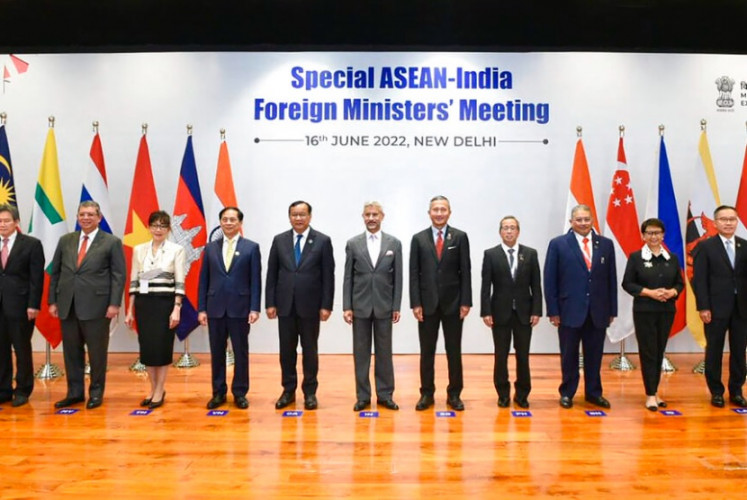Digitalized economy: Embracing technology, reducing disruption
At least three strategic issues should be taken into account when formulating the digital economy for more inclusive economic growth.
Change Size
 The digital and communication technology is in full swing. (Shutterstock/Rawpixel.com)
The digital and communication technology is in full swing. (Shutterstock/Rawpixel.com)
T
he digital and communication technology is in full swing. By 2030, 8 billion people and 25 billion smart devices are estimated to be connected to one enormous network. This dynamism offers innovations and efficiencies to kick-start productivity to deliver strong, sustainable, and inclusive growth. However, such a future is also demanding and disruptive, and could deepen social and economic divides. The participant countries of the recently concluded annual meeting of the International Monetary Fund – World Bank Group in Bali should act now.
At least three strategic issues should be taken into account when formulating the digital economy for more inclusive economic growth.
Firstly, by connecting people through affordable and reliable infrastructure. Barriers to access and effective use of digital technologies typically include some combination of a lack of high-quality and affordable infrastructure. The high costs and poor access to financing for smaller firms to develop the digital ecosystem will decrease potential investors, thus making digital technology accessible only for a certain group of people in countries.
These barriers can be reduced by implementing comprehensive digital strategies to improve competition in digital markets and improve internet access for disadvantaged groups or people in rural areas, including local small and medium enterprises. Ensuring internet openness and cross-border data flows are imperative to ensure access to information among a populace.
Key barriers to high-speed networks and services include the characteristic of infrastructure when it is controlled by a monopoly, which can impede market entry. It means the infrastructure provider may determine the cost and tariff to the customer in a certain area.
Secondly, by empowering citizens with skills and sufficient education, to help people displaced by technology to find new means of income. They should be armed with digital literacy, numeracy, problem-solving and basic information communication technology skills, as well as social and emotional skills in the digital environment; all these skills needed to succeed in the digital economy. Likewise, business owners and employers should support life-long training to improve workers' skills to embrace technological progress.
Lastly, a digital economy needs an improved digital infrastructure and legal framework. As regulatory frameworks tend to evolve more slowly than digitalization, 20th-century laws commonly guide 21stcentury, digitalized economies and societies – as reflected in unrest and disputes over online transportation apps in many countries. Hence the concerns that organizations and consumers are losing benefits and opportunities. Further, they face inadequate protections and greater uncertainty.
The participant countries in the recent IMF WB meeting should therefore review their legal and regulatory frameworks and, where appropriate, update them to ensure their effectiveness in a rapidly changing technological environment.
One of the important legal areas affected by digitalization is competition. Digital information is the most vital competitive asset in some markets, thus needing different approaches to market power and definition of diverse markets, and a greater focus on international cooperation and coordination among national competition authorities. Digitalization promotes greater competition in various service and product markets, both internationally and domestically.
Digitalization has destroyed geographic market boundaries by facilitating the entry and growth of internet-based suppliers and marketplace as in the cases of Traveloka, Tokopedia and Amazon. Governments should consider updating laws and regulations that unnecessarily make working through online platforms less attractive including lack of clarity in laws and regulations, tax issues and consumer and privacy protection of online market participants.
Meanwhile in the European Union businesses must now adjust their business models to comply with the most comprehensive data protection regulation on earth. The General Data Protection Regulation became effective since May this year. All governments should clearly make robust policies and practices to address digital security and privacy risks without hampering the potential of digital platforms.
As some of the participant countries in the Bali meeting have a data localization policy, bilateral or multilateral agreements could help participant countries create and improve digital services for their citizens without hampering innovation and invention. The countries could also initiate international arrangements on effective privacy and data protection across jurisdictions, digital data flows across the nation, including through national privacy strategies that foster interoperability among frameworks. They could explore opportunities for strengthening cooperation and international arrangements that promote greater sharing of digital information.
Such international agreement and strategies should incorporate the flexibility needed to take advantage of digital technologies for the benefit of all people. For example, the Safe Harbor framework governing data flows between the European Union and the United States also highlights how data flows matter for small and medium enterprises in the regions.
It is now high time for Indonesia to have an integrated digital data policy as a national master plan on the management of digital data aimed to optimize the economic and social advantages expected from digital openness. It is imperative to boost the digital trust from any relevant parties and leverage the digital economy for the good of all humanity.
***
The writer is a legal technology expert in computer and communications law at the School of Law, Queen Mary University of London, and a recipient of the Chevening scholarship.








